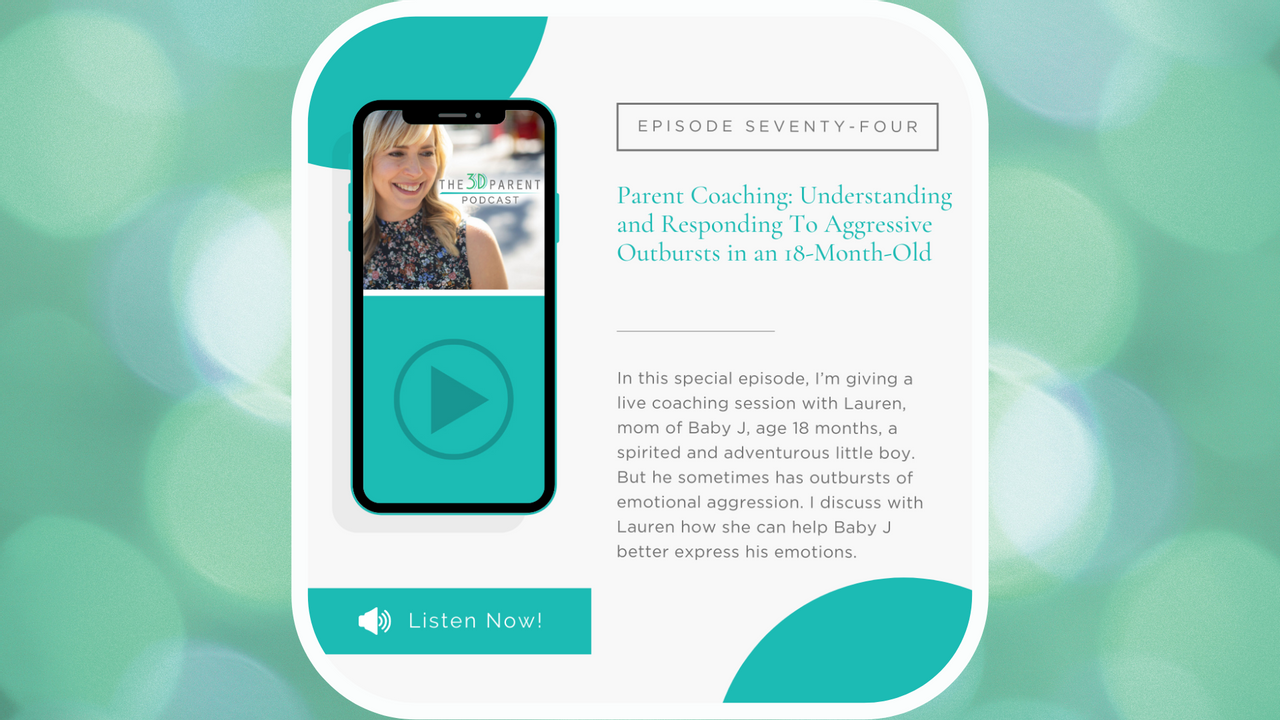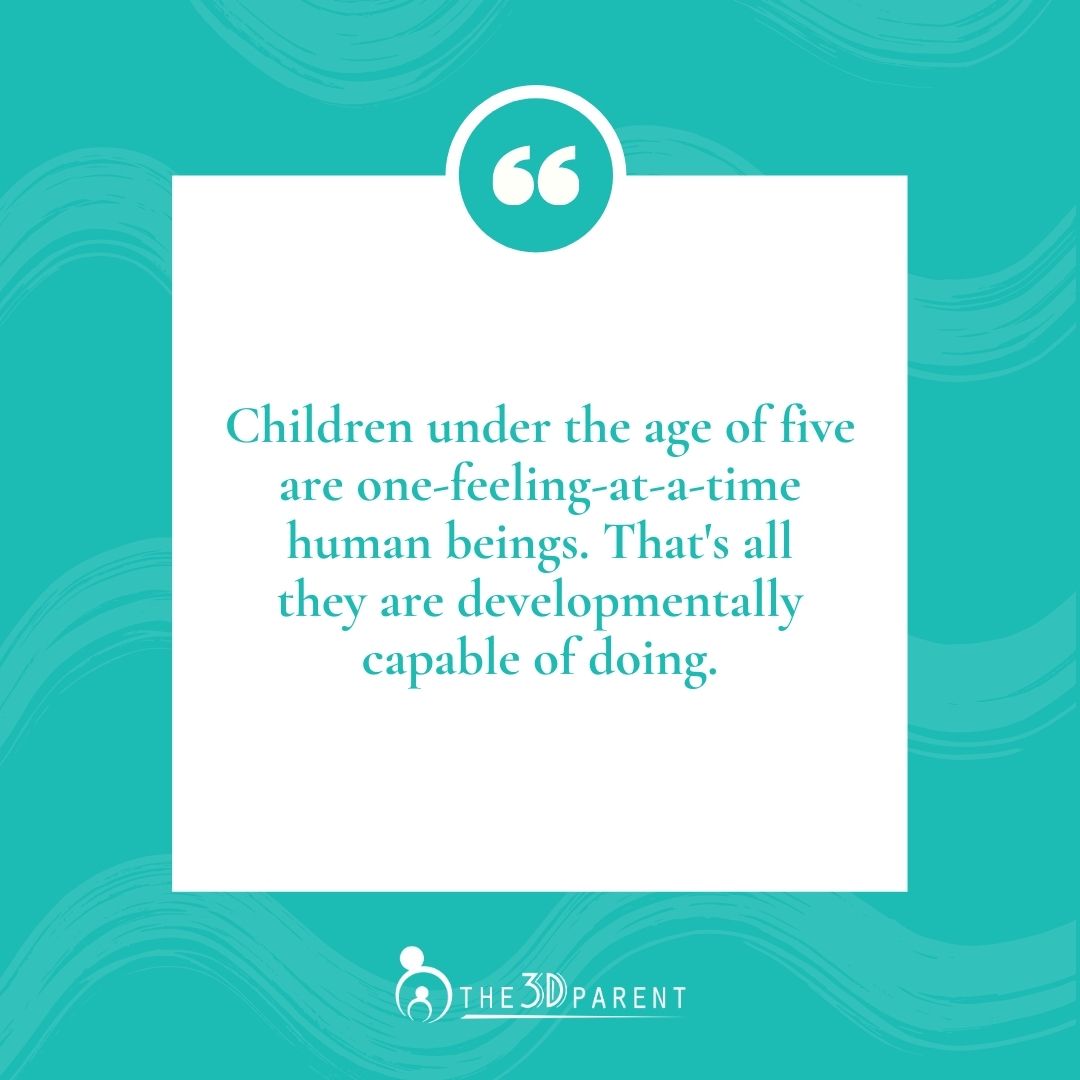[00:06] In this special episode of The 3D Parent Podcast, I’m giving a live coaching session of myself working with a parent on a specific challenge they are facing. We’ll dive into the history and causes of the problem, as well as discuss potential solutions using the 3D Parent approach. I am joined today by Lauren, a mom of an 18-month-old boy. She and her husband live and work from home in Seattle. Lauren is an entrepreneur with a business she owns, plus several "job-hobbies", including teaching and skiing. She and Baby J love to ski, cook, and clean the house together. Baby J is at the age where he doesn’t yet realize what a drag housework is!
[03:27] The main challenge Lauren is experiencing with Baby J is his tendency to sometimes act out a little aggressively. If she had to pick one word to describe Baby J, it would be determined. If you ask him to do something he doesn’t want to do, he reacts by head butting. He might hit his head on the floor or against you if you’re holding him. Lauren finds that if she reacts to the head butting or shows that it hurts her, Baby J gets more upset. She is concerned because she doesn’t want him to injure himself, and she wants him to be able to deal with his anger in a more constructive way.
[07:40] Lauren says that head butting is the only physically aggressive thing Baby J does. In terms of his language acquisition, Baby J currently uses a mix of spoken and signed words. He is better at understanding language than communicating language, all of which is developmentally appropriate.
[11:36] I wanted to know more about Baby J’s overall temperament. Some children have a more docile temperament while others are more “spirited,” prone to larger outbursts of emotion. It’s a natural variance in personality. Lauren says that Baby J is more on the spirited side. I also asked if Baby J tends to be more sensitive in general to stimulation. Some children are extra sensitive to light, smells, loud sounds, and textures. She says that Baby J is quite comfortable being in a variety of environments.
[17:16] I asked more about Baby J’s reactions to other people’s emotional expressions. Lauren says that he is definitely attuned to that. He picks up on her and his father’s emotions. And even with masks on, he is able to interact with other people based on their facial expressions if he’s with people in public. He has a bit of separation anxiety, which is normal for his age. But he is somewhat comfortable meeting new people.
[24:15] When examining the root causes of what might be making Baby J upset, it’s helpful to think about where he is developmentally. At his age, he wants to express himself, but he doesn’t have mastery of language yet to do that. That alone is frustrating. It’s helpful to remember that as you deal with kids this age. I told Lauren that what she’s already doing with helping him sign is great. This gives him multiple avenues to express himself. It’s also helpful to remember that young children are only capable of experiencing one emotion at a time. It’s not really possible to expect a young child to have the reason, logic, and emotional maturity to process their emotions. They just need to feel and express themselves. I suggested to Lauren that for this reason, it might be helpful to teach Baby J some signs for emotions.
[31:46] Another important thing to remember is that emotion seeks expression. It’s counterintuitive, but trying to stop or distract a child from feeling can actually make things worse. It just delays when they are able to express their emotion. It has to come out eventually. I often reference Dr. Gordon Neufeld on this podcast. He says that parents have to be both the “agent of futility and angel of comfort.” What he means is that parents have to set rules and limits but also comfort children in dealing with these limits.
[36:41] When children are upset, it’s because there’s some kind of futility they don’t want to accept. If you set a limit with them, they naturally don’t want to accept the limit. But it’s your job as the parent to help them deal with it. I suggested to Laura that it’s okay to address the head butting by saying something like, “I can’t let you do that right now; we have to be safe,” while also affirming his emotions. You’re trying to get them to accept the futility. This way, the more they practice this, the easier it will be for them to accept futility in the future.
[43:35] I assured Lauren that aggression is a common issue, especially in more “spirited” children. I told her that her instinct to stay calm and neutral is absolutely right. Getting upset herself will just upset Baby J more. And you never want to make a child feel responsible for your emotions either. I also suggested to Lauren that she should limit giving Baby J a choice. Parents, with the best of intentions, sometimes offer children choices. But, especially for young children, this sometimes can backfire. They might feel confused as to why they have to make a decision about their own care. So telling them, rather than asking, actually might be more helpful.
[52:25] I am so grateful to Lauren for coming on the podcast and talking openly about her challenges and triumphs with Baby J. I am sure that so many of you can relate, and I hope that you find this episode helpful. You can follow Lauren on Instagram where she is documenting her outdoor adventures with Baby J!











